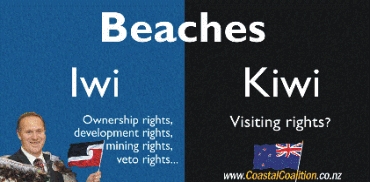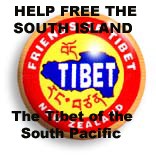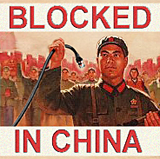South Island independence?
AMBER HOUSE - at the centre!™ a Bed and Breakfast Guest House (B&B) in Nelson city centre - handy for Tahunanui Beach, Restaurants, Founders Park
and the 3 National Parks of Abel Tasman, Kahurangi and Nelson Lakes in the `Top of the South' Island of New Zealand (NZ).
Economically, the North Island is dragging us down.
One only need look at New Zealand's ‘International Trade’ figures to see this fact.
The latest published figures, straight off the Statistics Department site:
a.) North Islands Balance Of Payments 2003
Total (in millions) Exported from North Island ports/airports NZ$21,500
Total (in millions) Imported into North Island ports/airports NZ$28,000
Trade Deficit; NZ$6,500 millions
b.) South Islands Balance Of Payments 2003
Total (in millions) Exported from South Island ports/airports NZ$8,500
Total (in millions) Imported into South Island ports/airports NZ$4,000
Trade Surplus; NZ$4,500 millions
These figures clearly show it is the South Island and not Auckland that is New Zealand's economic powerhouse.
The South creates the wealth.
The North spends it.
Then there is New Zealand’s massive Tourism Industry which is worth an estimated 7 Billion Dollars each year to the current combined economy.
Now imagine separate North and South Islands, independently governed.
Then go ahead and ask yourself - ‘just how many out of those 2.3 million who visit our shores each year would opt to tour just the North Island, when the South offers them the best, most varied scenery as well as the friendliest natives’?

Yes folks, it’ll be time to sell those shares in Auckland Airport when we go it alone.
The real questions to ask are:
Full independent sovereign nationhood like the Republic of Ireland
or
just internally self governing like
Jersey and the
Isle of Man
or
a federated state like British Columbia in Canada?
23 October 2007: The South Island's population has topped one million for the first time.
An estimated 1,008,400 people were recorded living in the South Island at June 30 this year, Statistics New Zealand said today.
This is a 1 per cent increase (9600 people) from June last year.
Smacking children not so harmful - study
More unpopular research reported by the New Zealand Press Association...The Coastal Coalition resists the privatisation of the foreshore and seabed in favour of corporate iwi
 The Coastal Coalition is an umbrella group formed to unite people who feel strongly that the foreshore and seabed are the
birthright and common heritage of all New Zealanders equally and should remain in Crown ownership. That's what they are campaigning for. Joining the Coastal
Coalition is free - it ensures our supporters of all races, from all walks of life, and of all political persuasions are kept informed about the dangers
and campaign to oppose change.
The Coastal Coalition is an umbrella group formed to unite people who feel strongly that the foreshore and seabed are the
birthright and common heritage of all New Zealanders equally and should remain in Crown ownership. That's what they are campaigning for. Joining the Coastal
Coalition is free - it ensures our supporters of all races, from all walks of life, and of all political persuasions are kept informed about the dangers
and campaign to oppose change.
By the end of summer 2011, John Key plans to have repealed Crown ownership through his Marine and Coastal Area Bill, opening the way for the effective privatisation of the foreshore and seabed to corporate iwi. The Attorney General has estimated that ten percent of the coastline will pass into private Maori hands as a result of the Bill. But the Maori Party has stated it will not stop until the whole coast is in Maori Title.
Tribalism -v- democracy
 This article postulates that New Zealand is at a crossroad between tribalism and democracy. "The Maori tribal elite, backed by the Maori Party - and
now the National Party - are gaining momentum, pushing the country towards a future where corporate iwi will control our key institutions and resources.
"
This article postulates that New Zealand is at a crossroad between tribalism and democracy. "The Maori tribal elite, backed by the Maori Party - and
now the National Party - are gaining momentum, pushing the country towards a future where corporate iwi will control our key institutions and resources.
"
The so-called "Maori" of today are not the Maori of 1840.
Most of those today claiming to be Maori actually have more of the blood of the colonisers than of the colonised. All have at least some European ancestry.
Even if Maori remained a discrete ethnic group, the Royal Commission’s recommendation that they be separately represented on the Auckland Council is based on an incorrect interpretation of the Treaty of Waitangi.
Under this set of assumptions, the Crown is in "partnership" with both a collective "Maori" and with individual Maori tribes deemed to hold mana whenua or "chiefly authority" over a particular locality.
The "partnership" fallacy is based on an erroneous decision of the Court of Appeal in 1987 case involving the NZ Maori Council. It rests on what researcher Alan Everton describes as "nothing more than the opinion of five judges who combined a lamentable ignorance of New Zealand history with a willingness to ignore the Constitutional principle that they were appointed to apply the law, not make it."
The Lange Labour Government's artfully sketchy references to "the principles of the Treaty of Waitangi" in the State-Owned Enterprises Act 1986 allowed these activist judges to conclude from the Treaty’s black letter clauses that it created "something akin to a partnership."
Yet Article I of the Treaty of Waitangi ceded sovereignty to the Crown "absolutely and without reservation."
Article II sets out the protection of existing property rights under the sovereign power acknowledged as henceforth prevailing in
Article I.
It guarantees: "Te tino rangatiratanga/full authority over their lands, forests fisheries and other property [the correct
translation in 1840]" not just to the chiefs but to "ki nga tangata katoa o Niu Tirani," that is "to all the people of New Zealand ."
It is only by dishonestly ignoring the words "to all the people of New Zealand " that "tino rangatiratanga" supports a claim under the Treaty that Maori retained their sovereignty, thus becoming "partners" with the Crown in some kind of sovereignty-sharing relationship.
Article III further underscores this position in granting to "the Natives" (not just to the chiefs) "all the rights and privileges of British subjects." Clearly, individual Maori could not enjoy such rights yet continue to be ruled in tribal style by chiefs.
There can be no possibility that the Treaty of Waitangi created a "partnership" or perpetual group rights for New Zealanders of Maori descent. Having signed the Treaty, the chiefs became not "partners" but subjects of the Crown, as did all other New Zealanders.
As subjects of the Crown - that is to say New Zealand citizens - today’s Anglo-Maori are entitled to the same rights as everyone else. In terms of political representation at any level of government, this means the right to stand as a candidate, the right to vote for a preferred candidate, and the right to make individual or collective submissions to elected representatives and public bodies.
Ngati Whatua’s demand for mana whenua representation is similarly flawed. It is often asserted that Ngati Whatua "gifted" the land on which Auckland City now stands to the Crown, thus entitling them to be involved on an ongoing basis in running the city.
The land was not "gifted" at all, but sold to the Crown for cash and goods. Once something is sold, it’s gone for good, and the seller has no further claim over it. In any event, like so many early land sales, Ngati Whatua’s claims to ownership at the time of sale are tenuous at best.
Ngati Whatua were not the first occupants of the Auckland area. Originally based further north, they colonised the locality around 1750 by exterminating its former occupants, Te Waiohua, rather than cheating them with pen and ink.
What goes around comes around. In the 1820s, the Tamaki Isthmus was repeatedly invaded by musket-toting Ngapuhi. The Encyclopaedia of New Zealand records that as a result: "much of the isthmus was abandoned as tribes sought shelter in the Tainui region."
Historian, RCJ Stone, notes: "fear of Ngapuhi prevented them [Ngati Whatua] from occupying their old home for many years afterwards, indeed, not until Auckland was founded [in 1840] did they feel safe."
Ngati Whatua thus sold to the Crown land they’d cravenly fled from more than a decade before. Land they neither occupied nor controlled in any meaningful sense. This placed the Governor and his troops between Ngati Whatua returnees and renewed hostilities from Ngapuhi. Payment from the Crown also underscored to neighbouring tribes that the mana of the land remained with Ngati Whatua.
While a clever stroke of business from both a practical and a Maori perspective, this hardly supports demands from Aucklanders of Anglo-Ngati Whatua descent for special political representation, even if this could be justified under the Treaty of Waitangi, which as we have seen it cannot.
Citizenship for sale
In an independent South Island, its citizens should own the state and its assets, rather than the state own them like chattels. As with any legal property, the owners should be able to sell their property for what the market will bear.
Some two millenia ago, the Roman state crucified someone who thought it an excellent idea to enjoy life on an individual, self-deterministic, free-will basis of voluntary consent among freely interacting people around the world. The state, in the form of the Roman Empire, did not take kindly to that sort of idea. The empire saw people as chattel property to be disposed of by the state as the powers that be saw fit; be it as slaves, lion fodder, serfs, artisans, minor functionaries, major functionaries, up to the emperor, with the power flowing from the top.
The harsh biological reality of the red in tooth and claw competitive, territorial, genocidal, tribes, with the biggest, most powerful tribes winning more territory and females, was just how things were.
As many aspects of life have changed, the whole basis of such life has been reduced to near-irrelevance although gangs and criminals continue such atavistic impulses and even some states continue to operate in the old way with places like Pakistan being hideous examples of raw tribal power.
We can own shares in huge, collectively owned companies, we can own land and buildings in fee simple, selling them as we like and moving on. But we can't own the most valuable asset which is our share in the state and its properties.
If we move to another country, we lose all of our property despite generations of ancestors having worked lifetimes to produce an inheritance for their descendants. A fresh-off-the-boat refugee from a hell-hole like Afghanistan inherits the lot on stepping ashore and is given a vote equal to those who produced the wealth over generations.
The current incentives are all wrong. The current system means people struggle to get near the levers of power to self-deal in tax revenue and property, and to reward people who in turn reward them with votes. While the democratic system does avoid the worst of the megalomaniac Saddam Hussein style of government, it still leaves the political system subject to the self-dealing abuse of power.
For example, the now-convicted previous immigration manager was ensuring her family and friends went to the front of the crowd trying to get into the free-loading society where the wealth of generations is being carved up. She was not ensuring the best for her country. Taito Phillip Field conducted similar operations.
The incentives are now for the productive to flee to Australia and further afield, while the indigent, grasping, dishonest, and bludging crowd in. Those who flee can take only their personal assets.
With tradable citizenship, people would vote for the politicians who would enhance their personal value. Citizenships would be going up in value and price, not down as we have seen for a generation since NZ was 2nd or 3rd in the world in wealth and quality of life. Now we're down with eastern European, ex-communist places which were previously horribly poor.
Instead of having immigrants win a lottery, or having to, or pretending to, "invest", a newly independent South Island would have outright sales of citizenships to the highest bidders. New Munster would sell Tradable Citizenships at the rate of perhaps 10,000 per year. They would be worth about $1 million each. That would provide revenue of $10 billion per year.
The buyers would make big profits if they decided to sell a few years later because the country would go from the back of the pack to the front as the whole economic foundation made a paradigm shift from a kleptocratic state to one run for the people by the people with individual people getting the reward for success rather than people in government circles taking the profits of control for their own purposes, ideology, and enjoyment.
With only 10,000 per year, it would take 100 years for another million citizens to be added to the population by these means. New Munster could take 30,000 such people a year and still not have a crowding problem.
10,000 would mean a vast economic boom. It would be a simply spectacular shift, likely to be copied by other countries when their citizens see the advantage of people being owners of their countries rather than mere chattels to be disposed of at the will of their governments, unless they leave, abandoning their share of national assets.
Suppose somebody from Japan, China, USA, Brazil, or Hong Kong would like to live in New Munster, at least for a good part of the time. They would not have to go through all the competitive bureaucratic nonsense of the current system. They could simply buy a new citizenship from the government, or an existing one, on the open market, and move in, staying as long as they like. If they decide after a few years that they no longer want to own a New Munster citizenship, they could simply sell it on the open market and leave. They would keep any profit.
You can be sure they would be voting in the meantime for politicians who make good decisions which enhance citizenship value rather than cause waste, dissolution, social carnage, and citizens to leave.
If a South Islander decides to leave to live in Australia, India or some other country, they could sell their citizenship, rather than simply abandon all their and their ancestors' wealth-creating efforts. Suppose somebody marries an American and they go to live in the USA. At present, they simply leave and bad luck for them. With a tradable citizenship, they would have a million dollars or so to buy another citizenship if required and to fund setting up their new life.
There could be a brisk trade in marriages, new citizenships, and changes in "allegiance" while people figure out how to best manage their lives.
We would go from has-been, sliding down the economic ladder with social carnage gathering pace, to top of the charts, most desired location on Earth, far better than Switzerland of the South Pacific, within a decade.
Modified from the writing of Maurice Winn, without permission.




